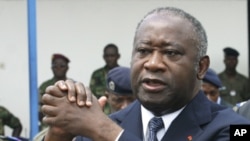Former Ivory Coast President Laurent Gbagbo has made his first appearance before the International Criminal Court, where he faces charges of crimes against humanity stemming from his alleged role in deadly post-election violence.
Gbagbo is the first former head of state to be brought to the ICC since its inception in 2002. He was read his rights during Monday's hearing at The Hague but declined to hear the charges against him.
The former president, wearing a dark suit, answered questions from judges and spoke about his arrest and transfer to the court during the 20-minute hearing.
He said French troops arrested him at the presidential residence in Abidjan in April and then handed him over to the forces of current Ivorian President Alassane Ouattara.
He also said his transfer to The Hague last week was preceded by a surprise judicial hearing for which he and his lawyers were unprepared.
The ICC's chief prosecutor, Luis Moreno-Ocampo says Gbagbo was an indirect perpetrator of murder, rape and other crimes committed during four months of clashes in Ivory Coast.
"The ICC is changing how the world manages violence," he said. "In the past, if you were head of state, you could commit massive atrocities and nothing would happen to you. Eventually, you would be a golden exile. This era is gone."
About 3,000 people were killed and more than a million displaced after Gbagbo refused to cede power to Ouattara, who defeated him in the November 2010 election.
As president, Gbagbo was able to mobilize sometimes violent mobs several thousand strong. The court says there are "reasonable grounds" to believe pro-Gbagbo forces attacked civilians thought to have supported Mr. Ouattara.
The court scheduled Gbagbo's next hearing for June 18, when prosecutors must convince judges they have enough evidence to bring Gbagbo to trial.
Chief ICC prosecutor Luis Moreno-Ocampo says investigations into the Ivory Coast violence continue, and charges against others are expected. He has previously said there is evidence that both Ouattara and Gbagbo supporters committed war crimes.
President Ouattara has created a reconciliation panel aimed at unifying Ivory Coast. He has vowed to hold accountable anyone who committed crimes during the unrest.
